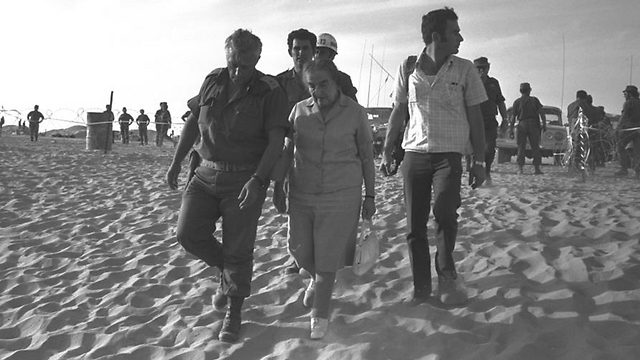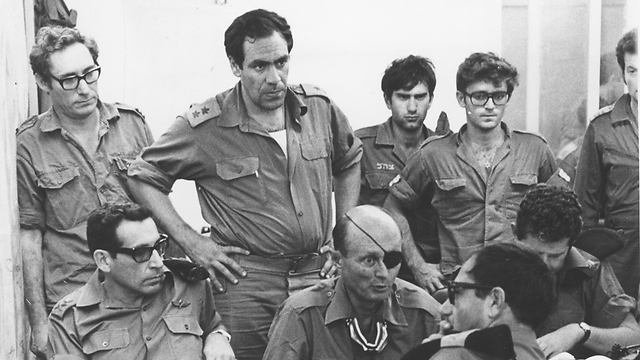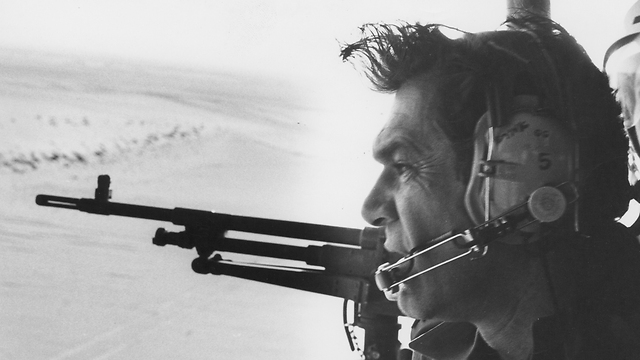Roi Mandel
Former Prime Minister Golda Meir didn't know that the "special means" that should have given notice of an upcoming threat weren't working; she trusted the generals and IDF Intel assessments, which turned out to be wrong, and talked about the sources that warned of a war and went unheeded.
These are the details of Golda Meir's testimony for the Agranat Commission that was published Thursday for the first time, 40 years after the war.
Related stories:
- Presidential Medal to be presented to Kahalani, Wiesel, Spielberg
- Ya'alon: We can rely only on ourselves
- Ministers recall Yom Kippur War experiences
On February 6, 1974, a few weeks after the elections for the eighth Knesset, in which the Labor Alignment Party won 51 mandates, Golda Meir came to the Agranat Commission which was set to inquire failings in the IDF 's conduct during the Yom Kippur War. She was asked first to talk about the warning signs to the war. She talked about the Syria alert, which was raised according to Military Intelligence Directorate (Aman) for fear it would strike Israel after the September 13 MiG incident.
Committee member, former Chief of General Staff Yigael Yadin, asked Meir invasive questions, compared to other members, who defended her. "I understand that if they brought their own our aircrafs, they should be worried about our response, but we brought down their aircraft. I couldn't get a logical answer," Yadin said. Meir replied, "According to Aman reports, the Syrians thought Israel was purposefully provoking them to drag them into a war."
The part of the testimony regarding the Intel the prime minister received on the eve of her trip to Strasbourg on Rosh Hashana was censored in the protocols, which were revealed to the public by the IDF Archives. The assessment is that it was information that Jordan's King Hussein gave Meir during their meeting a day earlier, a meeting about Syria and Egypt's intent to start war.
Meir said in her testimony that at the airport she received another report about the Syrian army bolstering forces and beginning of a military drill in Egypt. Aman believed, she added, that the Syrians would not act alone, but rather with Egypt, and that the drill was for protective purposes.
'Hard to predict unreasonable moves'
Meir was asked if she received any major updates while she was abroad, and she replied that she had. Minister Yisrael Galili asked to hold an urgent meeting as soon as the prime minister returned to Israel. "It was about the Golan Heights, but he made it vague, because it was on the phone," she said.On October 2, then Defense Minister Moshe Dayan talked to her about events in Israeli fronts.
Despite the severe oversight, Meir supported Aman in her testimony. "I think one of the huge things we have, which could be said to be luck, is that we have Aman and other Intel services that not many countries can compete with," she said. "It's hard to predict unreasonable moves," she explained about Egypt.

Golda Meir and Ariel Sharon in Sinai, 1973 (Photo: GPO)
She talked about the leadership of Anwar Sadat. "One fine day he woke up and decided to not ask any questions and told the Russian advisors to go home. We have to be ready for unreasonable things; we've always had erratic neighbors who don't always do logical things."
Regarding the raised alert in May of 1973, Meir said Aman was right in its estimates. She explained how her military secretary, Brigadier General Yisrael Lior, stormed into her office in the middle of lunch, reporting raised alert in the Egyptian air force. "It turned out Aman was right," she said. The raised alert in May solidified feelings that the Egyptian president wasn't serious. "We were used to the fact that Sadat – now we can almost tell him we're sorry – wasn't a serious man. That he throws around dates and then doesn't stick to them, and we certainly talked lightly about how the Egyptian people could tolerate him. Aman came through."
On September 30, a Mossad source gave intel that a big Egyptian drill would develop to a crossing, but that information never reached Meir. In the meantime, she said, Intel came through about army forces being bolstered. Aman agreed that according to the Soviet Doctrine, they could go on strike, "but they were unlikely to. I wasn't the chief of general staff, I didn't know anything about defense systems, but it bothered me."
Codeword: War
In a meeting set upon her return from Strasbourg, that the Chief of Aman, Eli Zeira, missed since he was ill, it was clear, Meir said, that the escalation required preparation. The next day Chief of General Staff David Elazar, the chief of Aman and the defense minister came to her office with more disconcerting information: The Russians were leaving. The Aman report, Meir said, was that there might be a war and the Russians were leaving, but it could also be a fight between the Russians and the Egyptians.Meir was asked if Aman Chief Zeira said there was Intel from the Mossad. "There was," Meir replied, but said she didn't know about Mossad Chief Zvi Zamir's journey to London. "I didn't know left," she said. "He usually calls but he got an urgent call and left immediately, and we knew he went to meet a source." Head of the committee Shimon Agranat asked Meir knew what the subject was of the invitation Zamir got. "I was told later the code was 'war'".
Yadin continued, asking if it was okay that Zamir didn't tell Meir before he left. "To be honest, at that moment I was a little angry," Meir said, revealing that she only learned of the trip on Friday, "Since it never happened before, but I stopped being angry right away. It just became insignificant. He knew what was going on in the fronts, he knew this is a source he could hear something important from, he got the codeword (chemicals, which meant war) and he went. And it's a good thing he did."

Dayan in the Yom Kippur War (Photo: IDF Spokesperson)
Committee member Haim Laskov asked if Meir felt something was happening due to the army boosting forces and the Mossad chief being away, and she said, "I was bothered. Certainly on Friday morning I was bothered. When they told us about the Russians, I didn't think I could argue with Aman, with the chief of staff.
Meir also talked about source, Ashraf Marwan: "I want to same something about the wrongdoing I did by this source throughout the years. I'd often tell the Mossad chief, 'Do you believe him? Are you sure?' I kept thinking, maybe this is misinformation."
Yadin asked Meir about a second source, the one who reported on September 30 that an all out Syrian-Egyptian war would start the next day. "On the day you left he said that on October first an all out war would start; Aman didn't believe him and sent him question, saying they know it's a drill. The source said the war would start as a drill." Meir replied, "He wasn't so hurt because we were hurt in the war, but mainly it was, 'you're not taking me seriously.'"
Didn't suggest drafting reservists
The commission focused on debating Aman's conduct and how it presented information to the prime minister. Meir said she thought that Aman was offering options and not coming to one conclusion. Judge Moshe Landau said: "I have the impression that there was a change there, that Aman became more decisive under Zeira, while Yariv was more like you desribed."The meeting on October 5 – Yom Kippur eve – didn't include the whole staff. "It was Yom Kippur and we couldn't find everyone," Meir said, "The Aman chief told us about the Russians again, and their assessment didn't change. So the Russian element didn't mean so much." She said she ordered to give Aman's assessment to US Secretary of State Henry Kissinger. "We got a summary about authorities, that if something would happen and we'd have to call reservists and we couldn't summon the government. The authority was given to the defense minister to act as needed."
The prime minister said no one in the government offered to call up reservists, despite the alert. "I've been agonizing about that since the war," Meir said, "Why I didn't suggest it. I don't know, maybe to comfort me, Haim Bar-Lev told me, "I don't understand you, there are generals, the chief of staff, the defense minister and the chief of Aman, and all of us didn't suggest calling up reservists. Then why should have you?"
Yadin, who was troubled by the ministers' lack of information regarding the Russians evacuating, asked Meir why there were moderate assessments despite the Russians leaving? "Surprisingly, the Russians sent ten planes, five to Syria and five to Egypt," Zeira said in that meeting, "We think they're for evacuation purposes, maybe for people or something else, we don't know." Yadin claimed Zeira knew for certain the Russians were evacuating people. "The defense minister wants to talk to the Americans, and the Aman chief is on his hind legs for ten minutes, afraid his sources will be gone," Yadin said. "There's an argument so there is a settlement. This thing that there was a hastened evacuation—that's the crucial thing that flagged a red light."
Judge Landau was more upfront. He wondered if the Aman chief made up the story about an argument between the Syrians and the Russians. Should the Aman chief have made the Russian information available fully to the ministers? "I think he should have," Meir said, but reminds the commission of the deep fear of information leaking. "I didn't know a forum in the country that didn't," she said, "there is fear, horror, that everything you say could leak, and it stops you from talking. I think it should have been said, about the Russian leaving. Losing sources is incredibly important, but it should have been said."
Still, Meir said, the government was worried about a trick that would drag Israel to the wrong conclusion. "They didn't suggest a draft, but rather an investigation if it's some trick. I tried really hard to relieve Saturday and Friday and Wednesday then, and not in light of what we know, and it was serious. I couldn't say, 'if they told me this I would do that,' I can't say that with full certainty. I went home troubled and I stayed troubled, but I can't, and couldn't since the war, say someone was guilty."
At this point the special means IDF had come up, the ones that were meant to indicate a war. "Did you know about any telling Intel… Bugging? What was your Intel about…" Landau asked.
Meir: "It's not how it should be. We invested huge amounts since 1967 to make sure a warning system existed. Unfortunately I have to make very complicated decision sometimes. We did fantastic things trying to make sure, to our best abilities, that we'd have warning."
Yadin: "Do you at least know today, today you surely know, but did you know then… Wasn't it open those days?"
Meir: "Of course I know today."
Yadin: "But you didn't know then. Were you sure it's open?"
Meir: "Of course. It was clear that it was… open, that there is a way to know. Now I know it wasn't open."
Yadin: "I don't want to shock you, could you maybe know that the chief of staff and the defense minister that it was open while it wasn't?" Meir: "I know all that now. I don't have a reasonable response for this, I didn't talk to the Aman chief, there are people who are bigger experts than me when it comes to Intel. You have to keep a source, but use the information you get. I can understand that there are sources you really have to preserve, but sometimes we were over guarded, like in this matter. They were standing on Saturday."
Landau: "On Saturday, on midnight, they opened…"
Meir: "Throughout the years there was a conspiracy that we'll know maybe 48 hours before."
Meir said the chief of staff insisted on an early drafting, since by the time the forces moved into action there'd be at least a day. "Under the force of not knowing, I said, let's draft," Meir said. She said Chief of Staff David Elazar said that either way they'll say about Israel that it's being aggressive if it calls up reservists, "so there was know difference between calling up 70 thousand, 120 or 200 thousand, if they're going to say we started the war."
'The heart was drawn to it, but I was afraid'
Meir criticized the defense minister. "He started and said, we have a difference of opinion, if you take the chief of staff's opinion I won't resign," said Meir, "I'm not saying he threatened resignation over every different of opinion, but it was something that was said. I said, I decided and that is that. He took it in good spirit, but I felt he wasn't convinced."
Chief of Staff David Elazar (Photo: Defense Ministry)
One thing, Meir said, she does not regret: Her refusal to authorize a preemptive air force strike. "The heart was drawn to it, but I was afraid," she said, "I can say with almost full confidence that if we launched a preemptive strike the American air lift wouldn't come through. I don't know if you know this, but the air lift didn't go so smoothly," she said. "I knew at least that accusation that we started the war won't be. I said, 1973 is not 1967 and we won't be forgiven this time. Maybe some men would still die, but I don't know how many more others would die because of lack of equipment."
Regarding the reservists draft, Yadin asked provocatively, "Could the prime minister also be thinking that we're close to an election, the labor party says it's quiet and everything is good and suddenly you have to crash the image?"
Meir: "I don't speak enough Hebrew to find the right words to deny that. Not only was that not said, it was never implied, and I'm ready to swear on that. Unthinkable."
The hour in which the war started, four hours before Marwan told Zamir it would, didn't surprise Meir. "For some reason…. He told us it would be at 6:00 pm. We kept looking where it said that it would be at 6 and it turned out it didn't say it anywhere. In one of the meetings, the chief of staff said, maybe it's at 5? So I said, why 6? Maybe it's a typo? Maybe it's at 4:00 pm? Maybe 4:00 am? I wish they wouldn't rely on it."
In the second part of the testimony, which took place in the afternoon, and surrounded more technical issues, Meir was asked about the warning on October 6 that the Syrians would start war. Meir criticized Aman: "It took them a long time, and I was angry with them."
During the prime minister's testimony members of the committee tried to understand why Americans and senior military staff didn't know the Russians left Syria before the war began. Meir said, "Aman may see itself committed to report to us, but I don't understand why the chief of staff and the defense minister didn't know."
Committee members talked about Aman's job and the Intel collection, including reporting it. Laskov talked about previous failings of Aman in the airport bombing and in the Munich Olympics in 1973. "There was information and someone decided it was nothing," Meir said. "Certain points should raise questions whether the assessment and decision making process is enough of a warning system if we miss so much."
Later during Meir's testimony reasons for meetings in Meir's kitchen and not in a larger forum were discussed, as was the leaking problem. Meir was also asked about appointing an Intel advisor to the prime minister as suggested in 1963.
Meir also discussed the cabinet meeting on Yom Kippur eve and Pinchas Sapir, who was said to take over as prime minister. "I'm sure if it wasn't Yom Kippur eve, I wouldn't spare members. There were three members in the kibbutz, I would tell them to come back, and call members from Jerusalem," she said. "But the Aman chief, the defense minister, the chief of staff, all said we didn't have to decide right then. I'm glad I at least invited everyone who was in Tel Aviv. We couldn't find Sapir," Meir said, "He's so small, we couldn't find him. I still don't know where he was."
Members then discussed the future of the records. "They're explosive," Yadin said, and asked if the committee was legally bound to show the protocols to the ministers and the Knesset. The members believed the protocols should be sealed and not shown to anyone. Meir thought the same: "I'd be happy if it'd be for the government and not the Knesset," she said.
Thursday, 40 years after the war, the protocols were released.
Yaron Druckman contributed to this report
No comments:
Post a Comment